- English
- French
- German
- Portuguese
- Spanish
- Russian
- Japanese
- Korean
- Arabic
- Greek
- German
- Turkish
- Italian
- Danish
- Romanian
- Indonesian
- Czech
- Afrikaans
- Swedish
- Polish
- Basque
- Catalan
- Esperanto
- Hindi
- Lao
- Albanian
- Amharic
- Armenian
- Azerbaijani
- Belarusian
- Bengali
- Bosnian
- Bulgarian
- Cebuano
- Chichewa
- Corsican
- Croatian
- Dutch
- Estonian
- Filipino
- Finnish
- Frisian
- Galician
- Georgian
- Gujarati
- Haitian
- Hausa
- Hawaiian
- Hebrew
- Hmong
- Hungarian
- Icelandic
- Igbo
- Javanese
- Kannada
- Kazakh
- Khmer
- Kurdish
- Kyrgyz
- Latin
- Latvian
- Lithuanian
- Luxembou..
- Macedonian
- Malagasy
- Malay
- Malayalam
- Maltese
- Maori
- Marathi
- Mongolian
- Burmese
- Nepali
- Norwegian
- Pashto
- Persian
- Punjabi
- Serbian
- Sesotho
- Sinhala
- Slovak
- Slovenian
- Somali
- Samoan
- Scots Gaelic
- Shona
- Sindhi
- Sundanese
- Swahili
- Tajik
- Tamil
- Telugu
- Thai
- Ukrainian
- Urdu
- Uzbek
- Vietnamese
- Welsh
- Xhosa
- Yiddish
- Yoruba
- Zulu
What is the Strength of Titanium Grade 2 Round Bar?
2025-05-15 16:56:56
Titanium Grade 2 Round Bar is a popular material known for its exceptional strength-to-weight ratio, corrosion resistance, and versatility across various industries. Understanding the strength characteristics of this material is crucial for engineers, manufacturers, and designers who rely on its performance in demanding applications. In this blog post, we'll delve into the strength properties of Titanium Grade 2 Round Bar, explore its applications, and compare it to other materials to give you a comprehensive understanding of its capabilities.
|
|
|
How does Titanium Grade 2 compare to other grades of titanium?
Titanium Grade 2, also known as commercially pure (CP) titanium, is one of several grades of titanium available in the market. When comparing it to other titanium grades, it's essential to consider various factors such as strength, ductility, and corrosion resistance.
Titanium Grade 2 offers a unique balance of properties that make it suitable for a wide range of applications. In terms of strength, it falls in the middle range among titanium grades. It has a tensile strength of approximately 345 MPa (50,000 psi) and a yield strength of about 275 MPa (40,000 psi). While these values are lower than those of higher-grade titanium alloys like Grade 5 (Ti-6Al-4V), Grade 2 titanium still offers excellent strength for many applications.
One of the key advantages of Titanium Grade 2 is its superior corrosion resistance. It performs exceptionally well in various corrosive environments, including seawater, acids, and chlorine-based chemicals. This makes it an ideal choice for marine applications, chemical processing equipment, and desalination plants.
Compared to higher grades like Grade 5, Titanium Grade 2 offers better formability and weldability. It can be easily cold-worked and welded without losing its corrosion resistance properties. This makes it a preferred choice for fabricating complex shapes and structures in industries such as aerospace, automotive, and medical devices.
Another important factor to consider is the cost. Titanium Grade 2 is generally less expensive than higher-grade titanium alloys, making it a cost-effective option for applications that don't require the extreme strength of more specialized grades.
In terms of biocompatibility, Titanium Grade 2 performs exceptionally well. It is widely used in medical implants and surgical instruments due to its excellent compatibility with human tissue and bone. This property, combined with its corrosion resistance, makes it a popular choice in the medical industry.
While Titanium Grade 2 may not have the highest strength among titanium grades, its combination of moderate strength, excellent corrosion resistance, and formability makes it a versatile and valuable material for numerous applications across various industries.
What are the mechanical properties of Titanium Grade 2 Round Bar?
Understanding the mechanical properties of Titanium Grade 2 Round Bar is crucial for determining its suitability for specific applications. These properties define how the material behaves under various types of stress and environmental conditions.
The tensile strength of Titanium Grade 2 Round Bar typically ranges from 345 MPa to 485 MPa (50,000 to 70,000 psi). This indicates the maximum stress the material can withstand before breaking when subjected to a pulling force. The yield strength, which represents the stress at which the material begins to deform plastically, is approximately 275 MPa to 450 MPa (40,000 to 65,000 psi).
One of the notable characteristics of Titanium Grade 2 is its excellent ductility. It has an elongation of about 20%, which means it can stretch significantly before breaking. This property makes it ideal for applications requiring formability and resistance to brittle fracture.
The modulus of elasticity for Titanium Grade 2 is around 105 GPa (15.2 x 10^6 psi). This value represents the material's stiffness or its resistance to elastic deformation. While this is lower than that of steel, it contributes to titanium's ability to flex under load, making it suitable for applications where some flexibility is desired.
Hardness is another important mechanical property. Titanium Grade 2 typically has a Rockwell C hardness of about 80-100. This moderate hardness contributes to its wear resistance while still allowing for machining and forming processes.
The fatigue strength of Titanium Grade 2 is impressive, with an endurance limit of approximately 300 MPa (43,500 psi) at 10^7 cycles. This high fatigue strength makes it suitable for applications involving cyclic loading, such as in aerospace components or medical implants.
Another crucial property is the material's impact strength. Titanium Grade 2 exhibits good impact resistance, which is particularly valuable in applications where sudden loads or impacts may occur.
The density of Titanium Grade 2 is about 4.51 g/cm³, which is significantly lower than that of steel (approximately 7.85 g/cm³). This low density combined with its strength makes it an excellent choice for applications where weight reduction is crucial, such as in aerospace and automotive industries.
It's important to note that these mechanical properties can be influenced by factors such as heat treatment, processing methods, and the specific form of the material (e.g., annealed vs. cold-worked). Therefore, when selecting Titanium Grade 2 Round Bar for a specific application, it's advisable to consult with material suppliers or conduct tests to ensure the material meets the required specifications.
|
|
|
How does the strength of Titanium Grade 2 Round Bar compare to stainless steel?
When comparing the strength of Titanium Grade 2 Round Bar to stainless steel, it's important to consider various factors including tensile strength, yield strength, and specific strength (strength-to-weight ratio). Both materials have their unique advantages, and the choice between them often depends on the specific requirements of the application.
In terms of absolute strength, many grades of stainless steel typically have higher tensile and yield strengths compared to Titanium Grade 2. For example, 316 stainless steel, a common austenitic grade, has a tensile strength of about 515-690 MPa (74,700-100,100 psi) and a yield strength of 205-310 MPa (29,700-45,000 psi). These values are generally higher than those of Titanium Grade 2, which has a tensile strength of 345-485 MPa (50,000-70,000 psi) and a yield strength of 275-450 MPa (40,000-65,000 psi).
However, the comparison becomes more interesting when we consider the specific strength, which is the strength-to-weight ratio. Titanium Grade 2 has a density of about 4.51 g/cm³, while stainless steel's density is around 7.85 g/cm³. This means that for the same volume, titanium weighs significantly less than stainless steel. When we calculate the specific strength (strength divided by density), Titanium Grade 2 often outperforms many stainless steel grades.
For instance, if we consider the specific tensile strength: - Titanium Grade 2: (345 MPa) / (4.51 g/cm³) ≈ 76.5 MPa/(g/cm³) - 316 Stainless Steel: (515 MPa) / (7.85 g/cm³) ≈ 65.6 MPa/(g/cm³)
This calculation shows that Titanium Grade 2 has a higher strength-to-weight ratio, making it particularly advantageous in applications where weight is a critical factor, such as in aerospace or high-performance automotive parts.
Another important consideration is corrosion resistance. While both materials are known for their corrosion resistance, Titanium Grade 2 generally outperforms most stainless steel grades in highly corrosive environments, especially in seawater and chloride-containing atmospheres. This superior corrosion resistance can translate to longer service life and reduced maintenance costs in certain applications.
Titanium Grade 2 also maintains its strength at higher temperatures better than many stainless steel grades. It retains its mechanical properties at temperatures up to about 427°C (800°F), whereas some stainless steels may begin to lose strength at lower temperatures.
In terms of fabrication, stainless steel is generally easier to weld and machine compared to titanium. This can make stainless steel more cost-effective for certain applications, especially when complex fabrication is required.
The choice between Titanium Grade 2 and stainless steel often comes down to the specific requirements of the application. If absolute strength is the primary concern and weight is less critical, stainless steel might be the better choice. However, if weight reduction is crucial, or if the application involves extremely corrosive environments or high temperatures, Titanium Grade 2 could be the superior option.
It's also worth noting that there are many grades of both titanium and stainless steel, each with their own unique properties. For any specific application, it's advisable to consider the full range of available materials and consult with materials experts to make the best choice.
Conclusion
In conclusion, the strength of Titanium Grade 2 Round Bar is characterized by its excellent balance of mechanical properties, corrosion resistance, and lightweight nature. While it may not have the highest absolute strength compared to some other materials, its specific strength and unique combination of properties make it an invaluable material in many industries. From its moderate tensile and yield strengths to its superior corrosion resistance and biocompatibility, Titanium Grade 2 continues to be a popular choice for applications ranging from aerospace components to medical implants. As with any material selection process, it's crucial to consider the specific requirements of your application and consult with materials experts to ensure the best possible choice for your needs.
At SHAANXI CXMET TECHNOLOGY CO., LTD, we take pride in our extensive product range, which caters to diverse customer needs. Our company is equipped with outstanding production and processing capabilities, ensuring the high quality and precision of our products. We are committed to innovation and continuously strive to develop new products, keeping us at the forefront of our industry. With leading technological development capabilities, we are able to adapt and evolve in a rapidly changing market. Furthermore, we offer customized solutions to meet the specific requirements of our clients. If you are interested in our products or wish to learn more about the intricate details of our offerings, please do not hesitate to contact us at sales@cxmet.com. Our team is always ready to assist you.
|
|
|
References
1. ASTM International. (2021). ASTM B348 - Standard Specification for Titanium and Titanium Alloy Bars and Billets.
2. Boyer, R., Welsch, G., & Collings, E. W. (1994). Materials Properties Handbook: Titanium Alloys. ASM International.
3. Donachie, M. J. (2000). Titanium: A Technical Guide. ASM International.
4. Leyens, C., & Peters, M. (Eds.). (2003). Titanium and Titanium Alloys: Fundamentals and Applications. John Wiley & Sons.
5. Lütjering, G., & Williams, J. C. (2007). Titanium. Springer Science & Business Media.
6. MatWeb. (n.d.). Titanium Grade 2 Material Properties. Retrieved from http://www.matweb.com






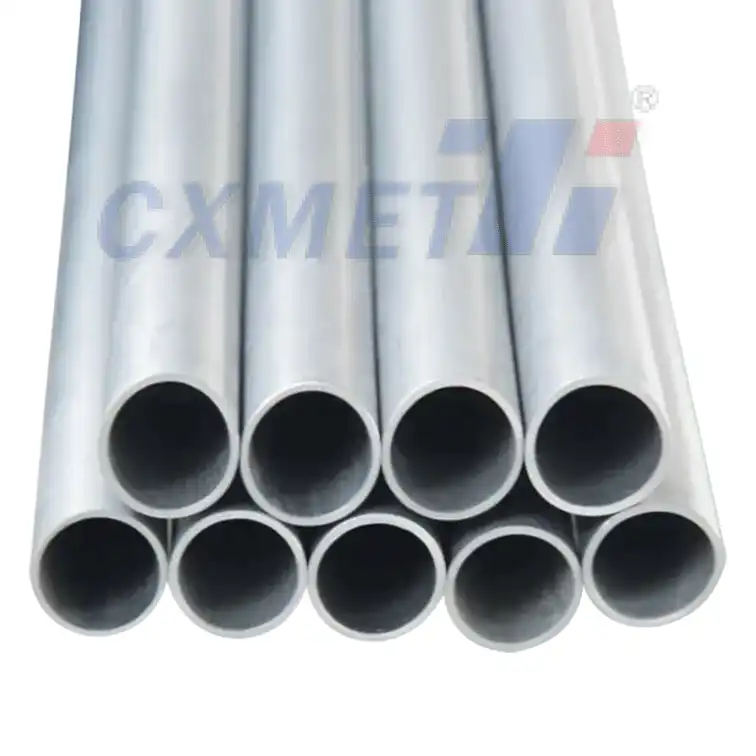
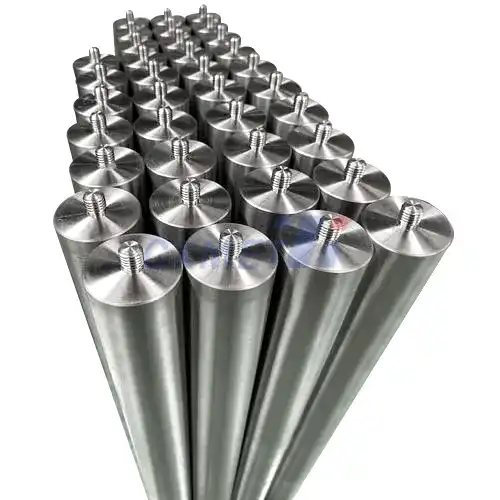
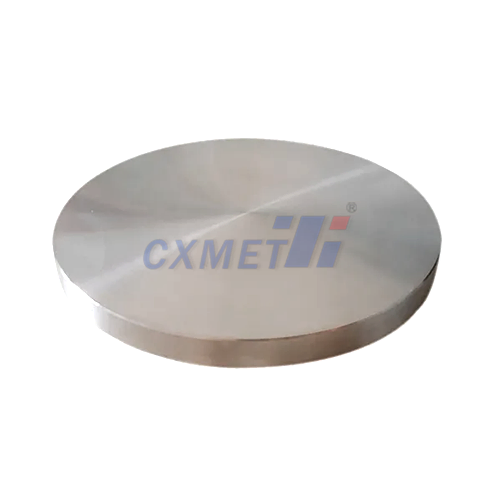
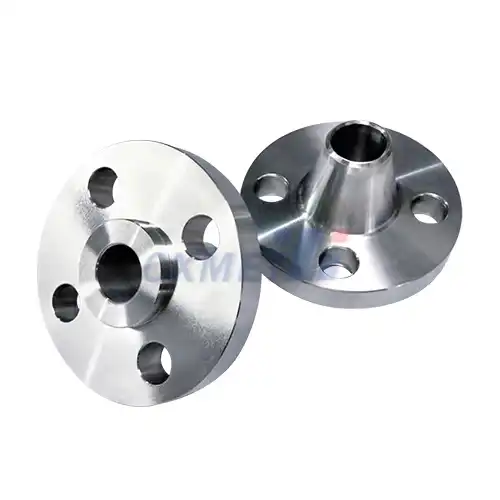
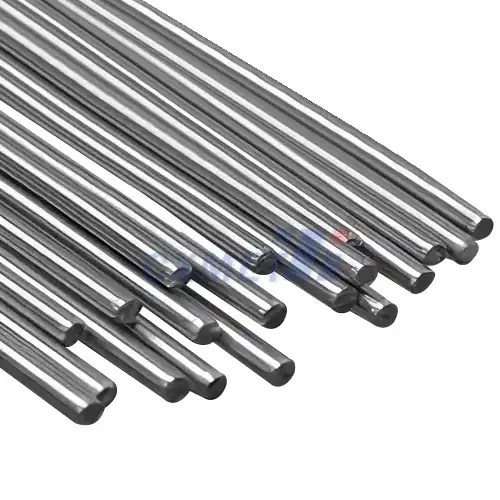
.webp)